Fic: Letters, or the Case of the Cerulean Syringe, Epilogue
Title: Letters, or the Case of the Cerulean Syringe, Part Eighteen (Epilogue)
Authors: sarisa_rahe & agaryulnaer86
Rating: R
Pairing: Holmes/Watson
Disclaimer: Do not attempt to operate Holmes and Watson while intoxicated. Also, these are not ours.
Summary: Watson discovers that some things are not as they seem, and some things will never change.
Spoilers: Movie
Warnings: ADORABLENESS.
Word Count: 5334
Author's Notes: Das ende. We hope you enjoyed. Also, if you'd like to read it all at our website, all in one convenient place, it's located here.
NOTE: If you would like to see a transcript of the images used (since Holmes' handwriting is illegible), please click here.
Previous Sections: One, Two, Three, Four, Five, Six, Seven, Eight, Nine, Ten, Eleven, Twelve, Thirteen, Fourteen, Fifteen, Sixteen, Seventeen
~~~~~
It's some two days later, when they've both sufficiently recovered from their endeavors, that Watson returns from his patient rounds to find Holmes gone from the sitting room. This would not be cause for concern, normally, but when Watson comes in to pick up the paper from its customary place (thrown on top of Gladstone, who has not moved and is currently unconscious beneath the window), he notices something extremely peculiar.
Despite the normal clutter thrown about the rest of the room, Holmes' writing desk is... clean. Entirely clean, the wood actually visible and the pens neatly placed in the drawer (save for the BEST pen, of course, which is in some undoubtedly ridiculous location). It's even been dusted, he thinks. In fact, the surface is entirely empty... save for a neat stack of letters written in Holmes' untidy (read: illegible) scrawl.
Watson peers down at them, curious but not enough so to invade his friend's privacy, no matter Holmes' habit of reading Watson's own mail before Watson receives it. He would have left the matter there, content to label it another of Holmes' many eccentricities, when he sees to whom the topmost letter is addressed. To... himself?
Well. If it's indeed addressed to him, and clearly left out into the open to be seen by the doctor himself, then he can't feel badly about reading it. Of course not.
Having sufficiently convinced himself, he picks up the stack, startled to discover that they are all addressed to him, and begins to read.
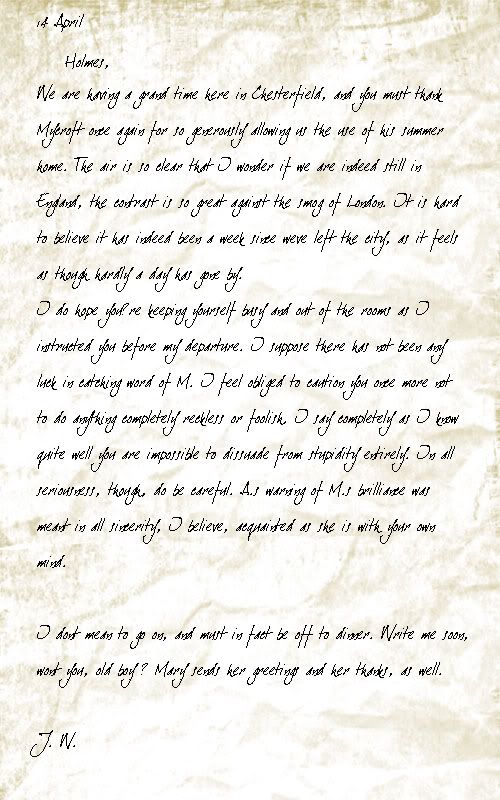
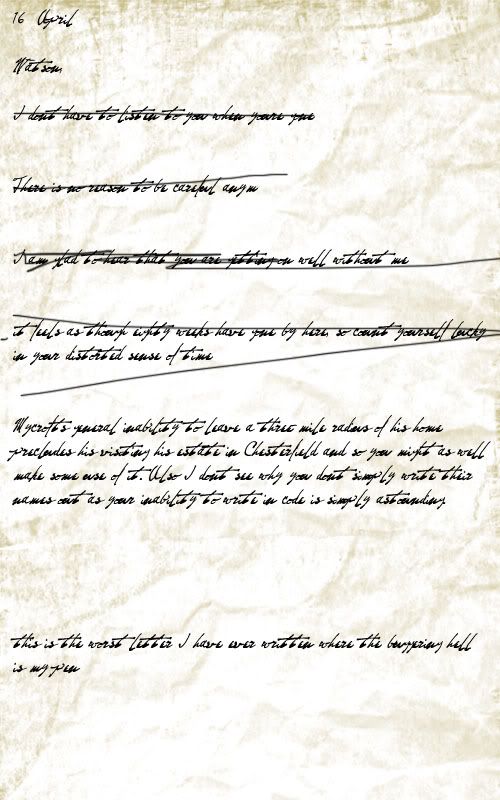
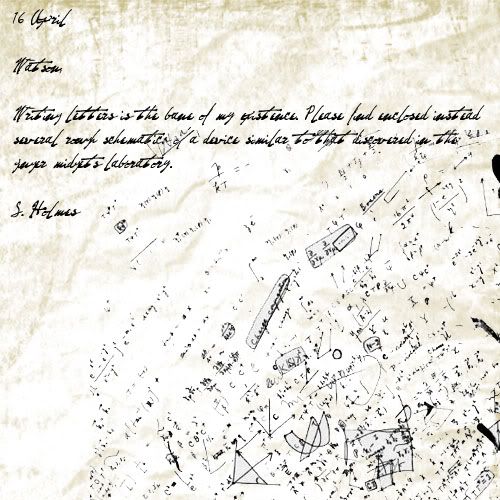
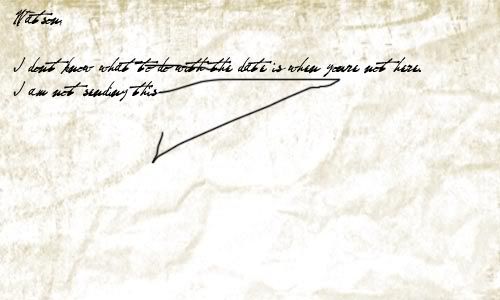
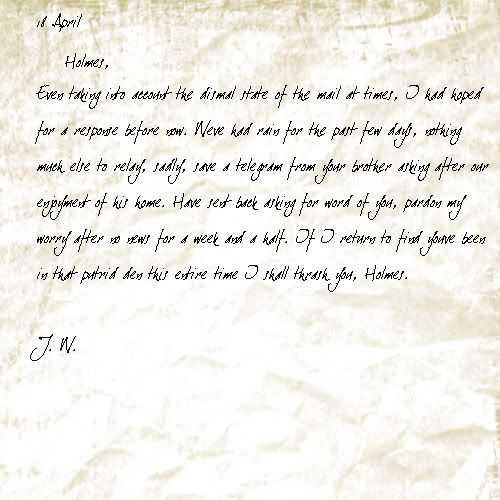
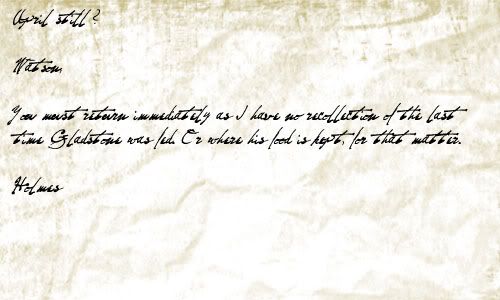
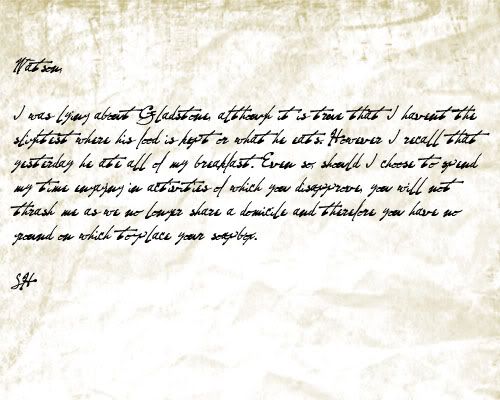
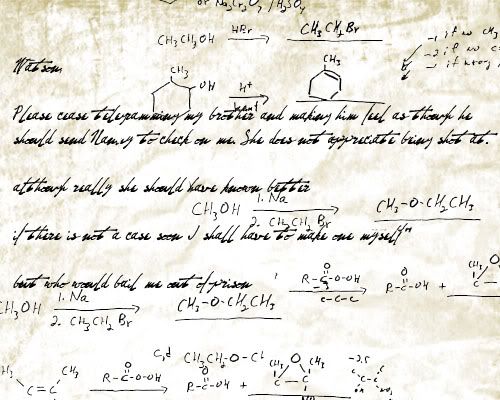
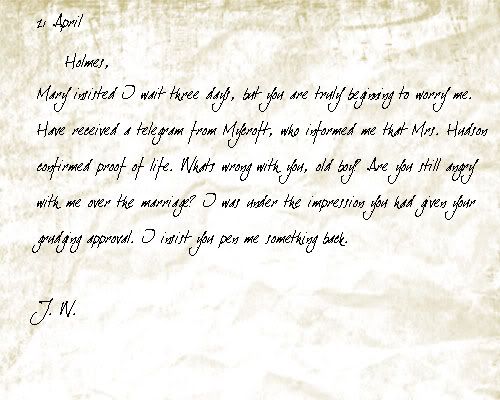
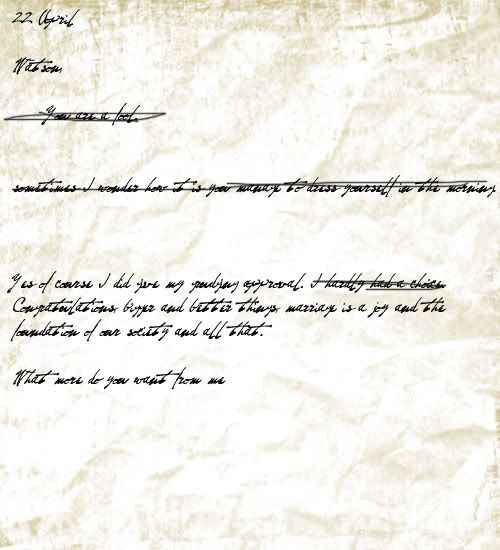
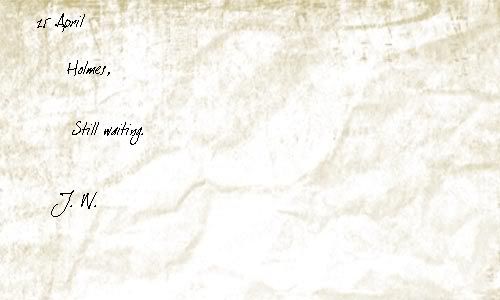
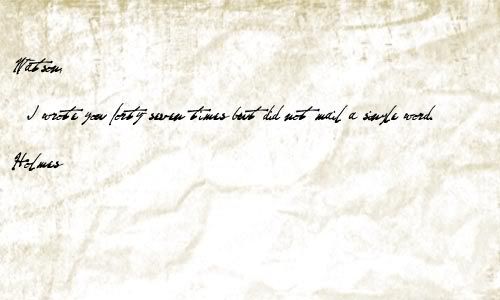
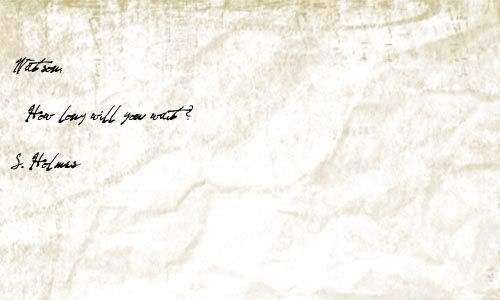
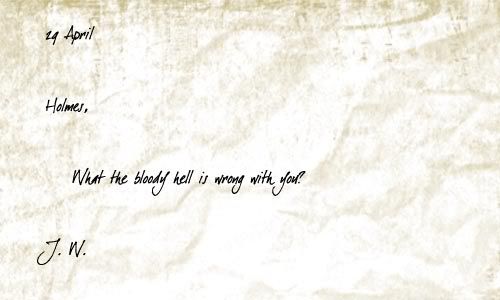
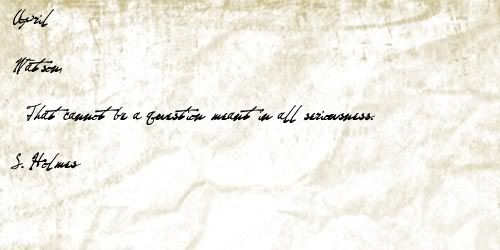
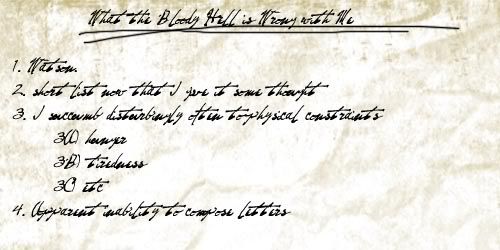
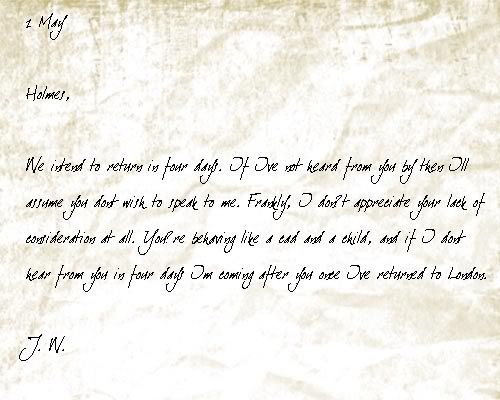
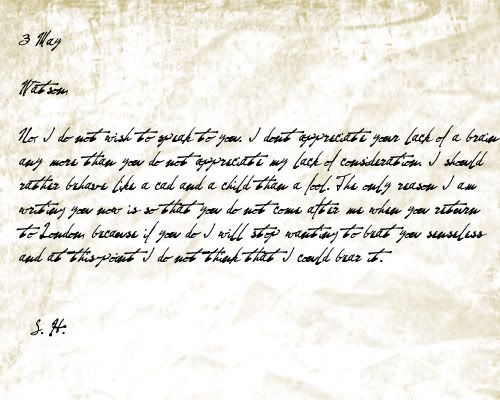
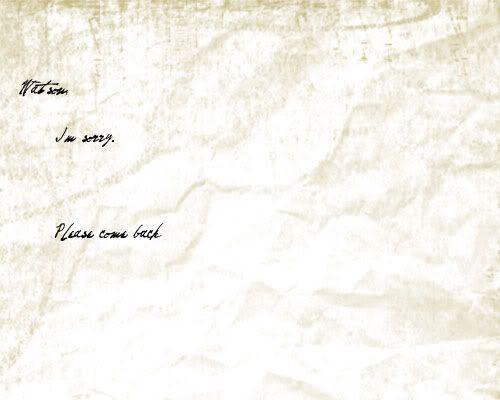
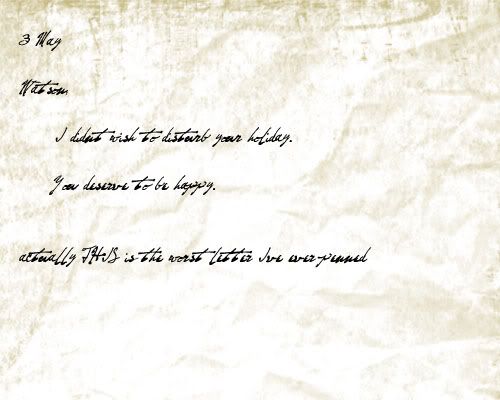
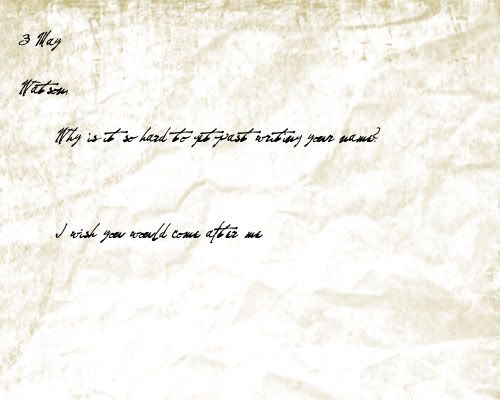
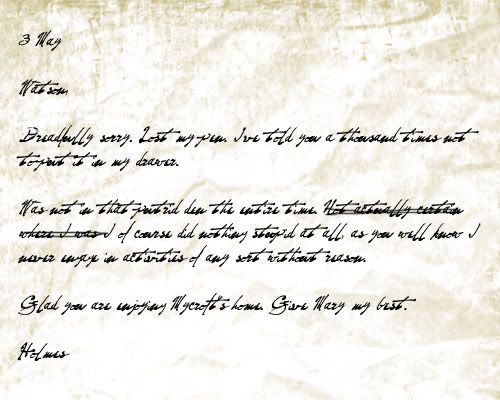
For a long time, Watson stands frozen in place, his only movement to flip through the crumpled sheets of paper. On the bottom of the stack, of course, is the letter Holmes had actually handed him, but he wonders suddenly if he would even have seen that one had he not arrived just as Holmes had completed it.
This... is the entirety of Holmes' feelings for him, scribbled out on papers that he knows he was never meant to see. And yet here they are, placed directly in his path... in place of words he suspects Holmes would not be able to articulate effectively. But this... this is... he doesn't know.
It summons a wave of guilt strong enough that it could easily knock him over; how could he have been so oblivious to his friend's feelings? How could he have been so cruel? And why had Holmes waited so long to... for Watson to guess? Why resort to that, why never say a word, for so many years...
Does Holmes truly believe him to yet be angry? He does understand, he truly does, knows that had Holmes not distracted the actress and locked her away, they might not have saved Miss Winstone. He's accepted it and moved on, knows it was for the good of the case and the girl they'd saved... and he knows that Holmes would do the same thing again if required. It's his work, and only an acting part, and considering all Watson knows of Holmes' (lack of) ability to so much as tolerate people, much less willingly kiss or touch them... he really should not have been so upset.
It had been a simple human reaction, and he's past it now. But... apparently Holmes had not known that. And yet Watson doesn't feel the need to enlighten him, after seeing these. No... this, this... reading the letters he does not regret in the least.
Footsteps creak on the landing outside the door, and Watson knows Holmes must be aware of his presence, as the detective would not make a sound without meaning to. Therefore, this is a deliberate warning of the other man's arrival. Watson lays the letters back down where he'd found them, turning to stare at the door as it opens.
The detective appears, and for all their years of closeness Watson cannot read his expression. Neither says a word for a very long moment until the doctor finally says, very quietly, "Holmes." Somehow, at least six emotions manage to be audible in that one word.
It is evident to Holmes long before Watson speaks that the doctor has read the letters he’d left, neatly and deliberately placed so as to attract Watson’s attention. No attempts at subtlety or misdirection. After the past few days, Holmes has had quite enough of that. For the first time in his life, he finds himself almost appreciating the lull in between cases, not so much because he doesn’t wish to be working, or his mind requires a respite (it would never receive one anyway), but because he seems to feel that quiet is sometimes necessary for proper absorption.
There has been quite a lot to absorb, after all, in the past few days.
The lack of a case time promised to Watson in which Holmes would allow himself to heal before running off in manic pursuit of the next great mystery, left the detective time. Nothing but time in which to consider-- quite thoroughly-- all of the wrongs he had done Watson. It had been easy to blame Watson for not seeing, for not knowing, somehow, all these years. But it had been wrong, incorrect, to allow Watson alone to assume responsibility for the mess that had resulted. Holmes, too, was to blame.
Watching Watson now, seeing the expressions on the other man’s face, hearing the emotions in his name… well. That was not the only wrong done the doctor by him. He has done Watson many wrongs, and he will continue to do so, and Holmes knows it. It is his nature that he is incapable of behaving in such a way as not to harm and constantly insult not only his closest companion, but everyone around him. Holmes has never minded, not until Watson. It was not until Watson that Holmes so much as noticed.
He doesn’t imagine he’ll change his ways. It’s impossible. And he wouldn’t want to change himself if he could. But Watson should know… that he tries. He tries, for Watson, to be… considerate. He bothers to think about someone beside himself, something he has never done before, not really. But Watson does not always see, because Holmes does not always let him. Watson has always been his closest friend and companion, but that… is not saying much. Watson is his only friend. Holmes has never quite grasped the concept. It’s been difficult, and maddening at times, trying to behave as other people do with their friends… and… other… relationships, he supposes. A struggle against himself, the way he has trained his very solitary, logical mind, and against his very nature.
But for Watson, he has tried.
He’s not doing a very good job, and that is frustrating to Holmes, The Great Detective. Even that would normally stop him, not being the best at something, not to automatically understand something perfectly, even with effort. But… he tries. He keeps trying. For Watson.
It’s another minute before Holmes says anything; despite the fact that he had left the letters to be found, he finds suddenly that he has no idea what to say. But then… that had been why he’d left the letters in the first place, hadn’t it? He meets Watson’s eyes for a short moment, then glances back down at the stack of letters on the desk before looking away, expression still unreadable. He knows what Watson found in there. Evidence of his desperation, his inability to let Watson go even when he knew he had to, that it was the right thing to do… for Watson’s sake. But also evidence of other things, he supposes.
Holmes gestures, almost half-heartedly, to the stack of papers there, not allowing himself to look back up at the doctor, but rather looking somewhere to the left of Watson’s shoes. “I wrote you,” he says finally, forcing himself to keep his tone vaguely normal, even. It’s almost a statement of the obvious, except it is really a direct response to Watson’s accusations all that time ago (was it really long ago at all?) when he had accused Holmes of not writing to him. Holmes remembers the conversation vividly. Holmes remembers every conversation with Watson vividly. He remembers everything vividly. “I acknowledged you every day.” No matter how painful it had been. It had been more painful not to acknowledge Watson, even when he had gone.
The detective shrugs a little, but the nonchalant gesture doesn’t have the same casual, indifferent attitude behind it as per usual. “It was sending it that was the problem, you see.” He glances up at Watson briefly, then away again. “Also composing a proper letter does not appear to be my strongest talent.”
Watson smiles crookedly. "No," he agrees. No, it is indeed not Holmes' gift. But despite the man's self-professed lack of talent at it, he'd still managed to convey his feelings with startling clarity, a fact for which Watson is grateful, now that he's been permitted to see the drafts. The fact that he'd been given permission to do so (and in fact had them pushed directly beneath his nose, where they could not be missed) is a shock in itself, especially from a man who wishes to have no emotions hinder him at all.
He shakes his head, stepping closer and breaking the spell that had held him still for long minutes. Holmes doesn't move, his scuffed boots rooted to the rug as Watson stops in front of him, no more than a foot away and eyeing the detective's torn dockworker's clothes with no little curiosity. But whatever Holmes had been doing (along the river, presumably) is not the most important topic at the moment, and Watson will inquire later.
"I do forgive you." His brows are raised slightly. "I forgave you the night we rescued Miss Winstone. I do understand, Holmes." He gestures to the desk behind him. "You've been forgiven for quite some time, now, if indeed forgiveness was necessary in the first place." It's clear that he's not only speaking of their... disagreement over his methods of subduing that dreadful Miss Baker, now.
He pauses, taking a short breath. "I do hope... I've been forgiven, as well. You've been... very quiet, since Miss Winstone's case."
However ill at ease Watson (proper as he is) is put by a conversation so closely dealing with this sort of emotional subject, Holmes is far worse; he not only does not care for emotions (and the conversations that go along with them), he finds himself quite inept at the expression of those emotions that he cannot manage to rid himself of. But once felt, they are not forgotten to the detective, no matter how he pushes them away or down or rids himself of them. And some things, Holmes has discovered, he cannot live without any more than the next man.
He is no perfect calculating machine. He is not that mad, untouchable and unaffected genius described in Watson’s recountings of their adventures. He only strives to be. But in reality, Holmes is human and isolated- by manner and by design- and lonely and difficult… and he needs Watson. There is no more logic to it than that. Without Watson, he cannot be that Holmes that Watson sees and writes about.
Holmes does not wish to allow his judgment to be biased. But he does not wish to be without Watson, either. But if he is anything, Sherlock Holmes is a man made of paradoxes. One more, he determines, does not decrease the value of the whole.
And so the detective spends another moment staring at that same spot, just to the left of Watson’s shoes; the spot has moved (as Watson's shoes have moved), but Holmes follows it, staring almost intently for a moment before finally forcing his eyes up to meet the doctor’s.
Whatever he sees there seems to be enough, because the detective’s relief is clearly visible in his own eyes a moment later. “Yes, Watson,” he says after a long moment, perfectly aware that the conversation has moved beyond the discussion of the Winstone case. “Irrational as it may be to make such a statement without examining the bounds of the subject thoroughly, I do believe I would forgive you anything.” He pauses. “However, I would not suggest testing the matter with my pen.”
As is often the case (pun intended) when one is dealing with Sherlock Holmes, Watson finds himself caught between being touched by the sort of words that come so rarely from the detective and being nearly exasperated enough to walk over and throttle the man. He settles for something in between, however.
"You," he says accusingly, pointing at Holmes' chest and starting to stalk closer. "And your bloody pen."
He makes sure to keep his approach as violent and angry as possible; it throws Holmes off, a bit. He can see the confusion playing on the detective's face. But it keeps him in place; if Watson had approached with some sort of touched expression, Holmes would have scampered. So, looking as though he intends violence on the other man's person, he stalks quickly over... and then enfolds the detective in a tight hug. More of a crushing maneuver, actually; he gets his arms around Holmes' shoulders and squeezes. Hard.
"Utterly ridiculous," he mutters, but he's smiling into the unruly black hair, highly amused by how still and stiff Holmes is in his arms. "Relax, won't you. This is akin to embracing a large piece of plywood."
Holmes looks more than a little thrown off by this entire reaction, appearing more like a cornered animal than a genius detective who is suddenly being embraced by his dearest friend... who is also, perhaps, much more than a simple friend. In fact, Holmes looks entirely shocked by this turn of events, his eyes widening almost comically, as though he has never been more surprised by anything in his entire life. Taking into consideration the detective's questionable record with interpersonal relationships, this might actually be the most startling thing that has ever happened to him.
It's a near thing, but Holmes does manage to convince himself that attacking and essentially throwing Watson off of him is unnecessary. Should anyone else have attempted this, Holmes naturally would remove the offending person. But Watson has always been the exception to the rule when it comes to allowing another individual in Holmes' personal space. Even, it seems, when the doctor is attempting to crush his ribs, something which neither Watson nor anyone else has ever attempted before, barring one or two exceedingly awkward moments with the Woman. So naturally, this is all very strange to the detective, although he will admit (privately) that it is not wholly unpleasant. Though he suspects such would not be the case were it anyone besides Watson attempting to crush him.
"Watson, that is an entirely insensible metaphor-" Holmes begins, but is cut off as he is suddenly crushed more tightly. Holmes begins to wonder if this is not some new way to keep him from speaking. It appears to be working, which naturally spurs Holmes to work harder to speak. Holmes' nature contains every bit as much contrariness as it does powers of observation. Not to mention his complete lack of a grasp on moments of an emotional nature. "I fail to see why you would embrace me or a piece of plywood, consideri- should you break my ribs you're going to be the one wrapping them and you always complain bitterly when-" A renewed bout of crushing merits a grunt as the air is pushed forcibly from Holmes' lungs, the detective's confusion increasing exponentially as it becomes harder and harder to comment. "Watson, what are you doing?!"
At least a hundred possible responses, flippant, serious, and otherwise, run through Watson's head in the seconds following that question, but in truth, he doesn't do more than close his eyes and remain as he is for a long few seconds more. When he finally releases the other man, Holmes' horrified shock is actually very amusing, and the doctor experiences a momentary struggle, wanting so desperately to laugh.
In the end, however, he does no more than shake his head, clapping Holmes on the shoulder. "Nothing, old boy. Absolutely nothing at all." His smile is amused (and patient, it must be said) as he imagines exactly how much pain he would be in were he anyone else attempting to embrace the detective.
He receives for his efforts a look that says clearly that the detective is of the opinion that Watson has gone completely mad; or, perhaps, that Holmes himself might have gone mad and not noticed. Holmes has seen some very strange things in his time, strange things indeed, but each mystery the detective has encountered he has been able to solve, every strange thing he has seen eventually perfectly explainable. This, on the other hand, seems to be so completely out of Holmes' realm of experience that he has no idea how to begin evaluating it, much less how to explain it in its entirety.
Hence the shock, mild horror, and absolute lack of understanding on the detective's face even after Watson's (exceedingly unhelpful) explanation. Holmes' eyes are still wide enough to be comical, and he appears to be so at a loss as to make an immediate response (normally whiplash-fast) impossible. Instead, Holmes can only stare at Watson for a long moment in confusion.
Nothing at all. Well. That is obviously physically impossible, indicating that Watson is not going to explain himself properly. This is highly annoying to the detective, who dislikes being kept in the dark about as much as most people dislike being drowned.
In the end, the detective seems to determine that there is no explaining the actions of Dr. Watson. Honestly, sometimes the man is downright unreasonable. Unexplainable. Maddening, really. Simply a lost cause. Holmes gives the doctor an appraising look before announcing, "That is hardly an explanation at all," running a hand through his already unruly hair (indicative, to the well-trained eyes of the doctor, of the detective's attempting to fit the pieces of a particularly difficult puzzle together with yet insufficient data), and then glancing back to Watson, the confusion written all over his features masked by resignation. "Sometimes you can be very difficult, Watson."
Watson's mouth quirks in a smile, but he doesn't refute that statement. Instead, he moves over to his armchair, picking up the afternoon paper and easing himself down onto the comfortable leather, his leg stiff from walking a fair distance while making his rounds. Stiff or not, though, he nevertheless props his feet up on the side table, opening the paper with a snap.
"Yes, well," he responds finally from behind the newsprint. No further addition to that comment is offered as Watson simply makes use of Holmes' favorite technique for dealing with difficult issues. He merely ignores the fact that the embrace had happened at all and moves on to the next subject.
The clock chimes four hours past noon, and he can hear Mrs. Hudson beginning to climb the stairs, undoubtedly in possession of their afternoon tea. Excellent timing, as always. He's quite starved.
A moment later Mrs. Hudson appears, their tea in hand, and finds herself confronted with an odd sight: Dr. Watson, peaceful as can be as he sits, reading his paper, and Mr. Holmes looking for all the world as though he hasn't the slightest what is going on around him. Even confronted with this obvious indication that something abnormal had just occurred, however, Mrs. Hudson is by all accounts a very proper lady, and does not allow any strangeness to bother her. She simply goes about setting their tea down as per usual, with a smile for Dr. Watson (who thanks her politely) and a sideways glance for Mr. Holmes, whose rather shocked demeanor begins to wane as he also retreats to the more normal activity of watching everything Nanny does with no little suspicion. She has a habit, after all, of cleaning things which are not in need of cleaning, and likewise of removing things which are not in need of removing, making even something as innocent-seeming as bringing tea a possibly nefarious act.
No foul play seems to be afoot here, however, aside from several indications that Mrs. Hudson is doing her best to cheer up the doctor with extra helpings of his favorite foods, which Holmes can hardly disallow. Nanny may be out to ruin him, but the woman's obvious affection for Watson is rivaled only by Holmes' insistence upon keeping the doctor's attentions to himself.
Which, naturally, Holmes does, quickly putting the recent... incident behind him in favor of the comfort of more commonplace, everyday activities as Nanny makes her exit. Managing somehow to look both graceful and though he is collapsing, Holmes falls into his chair, glancing several times over at Watson sidelong while keeping the bulk of his attention seemingly on his hat, which he did not put away but rather seems to have materialized and is now the subject of his interest (food is very rarely of interest to Holmes, though judging by the way he's attacked that tray, Watson was half-starved).
"Does your paper tell you, Watson," Holmes begins without looking over at the doctor, but rather suspiciously eyeing the hat in his grasp- not his typical hat, no, but rather one Watson has never seen, "that in the past two days, two ships have gone missing from their typical routes on the Thames?"
Immediately suspicious, Watson glances sidelong at Holmes and then flips quickly through the paper, scanning the articles.
"No," he says slowly, a dreadful feeling suddenly overtaking him. He suddenly wonders if the wisest course of action would be to simply stand and walk out of the room before Holmes can inform him of why he'd brought the subject up.
But that plan, of course, would leave Holmes alone in what is obviously a new case, and Watson is loathe to do that. Cursing under his breath, he sighs. "Why do you ask?"
Watson's suspicion goes unheeded (but not unnoticed); this question provokes nothing but pleased interest from the detective, who is, as always, quite happy to explain the details of a new case to Watson. Especially such a potentially interesting new case. Entire ships, gone completely missing. That is simply not something that happens on a daily basis, barring that one time during the Blackwood case, but that was obviously not quite the same. In that case, everyone is very well aware of what became of that ship.
"Mere curiosity," Holmes assures him. "I simply wondered if they would have kept it from the papers. The shipyards are in a panic." Panic enough that the wealthy owner of a shipping business had written Holmes in a frenzy, demanding answers and offering a sizable sum in return. Holmes could care less about the money. But the missing ships? Curiosity is what he calls it, but for Holmes it goes so far beyond curiosity as to become another thing entirely.
Holmes turns to look at Watson, now, steadfastly ignoring the doctor's suspicion, then glances at the clock on the mantel before recalling that he'd dismantled it for parts. "Do you have the time? I should have some few hours before I'm on the clock, as it were. I would rather not be late."
Watson blinks, this time actually lowering the paper. "On the clock," he echoes, wondering if he should truly be surprised. He suspects not. After all this time... well, he is referring to the man who would and has taken all manner of jobs and even gone so far as to falsely propose marriage in order to successfully solve a case.
Well. This does explain the new hat, he supposes. Shaking his head slightly, he returns the paper to its previous position, moving back to the second page, where he'd just been reading an article on Parliament's latest act (at which point he'd skipped ahead to scan for titles involving ships on the Thames).
Smiling slightly to himself, he adds, "I do hope you enjoy scrubbing decks and shoveling coal. It sounds scintillatingly exciting."
If Holmes were not so used to remaining composed, this would receive a laugh from him. As it is, he simply grins very minutely to himself, knowing that Watson cannot see him with the paper obscuring his vision. A moment later, the grin is gone, and Holmes is simply inspecting the hat in his hands. A hat which, if Watson had been paying attention, he would have noticed was not the hat Holmes had been wearing when he came in. In fact, if Watson had been paying attention, he would have noticed that that hat is still in one of Holmes' pockets.
Well. Unfair it might be to expect Watson to be as observant as the detective, but he might pay a little more attention. Still, Holmes is quite used to Watson being a few (many) steps behind and so does not mind in the least enlightening the doctor.
"Indeed," Holmes agrees, paying no mind to the amusement in Watson's tone. "How convenient that the prospect excites you." The detective pauses, looking over at the doctor, and flashes the other man a quick smile; an expression which, from Holmes, has only ever led to disaster. "I'm sure you'll prove Tanner wrong after all."
Watson's eyes widen--he'd been about to inform Holmes that it's half-past four, but the time is quite driven from his mind.
"No," he says flatly, refusing to lower his paper. "I've no desire to... no. I don't enjoy boats, Holmes, and to be honest, I believe your record with regards to them has not exactly been stellar, either!"
There is no comment from the man sitting to his left, and he scowls, snapping the paper shut. "I will not. I've no time for some ridiculous false employment, that's quite your department. I have patients, Holmes!"
To that, Holmes can only raise one eyebrow, leveling an appraising gaze on the doctor for a moment before turning away to look down at the hat in his hands, very nearly shrugging. He is quite used to Watson's refusals to accompany him, or to do this or that, whatever the man thinks is inappropriate or gets into his head he doesn't wish to do. So this is neither surprising nor unusual.
Despite the fact that Watson is only refusing to do something Holmes had signed him up for without his permission, not to mention how reasonable his argument is, Holmes manages to look disappointed. And as though Watson had said something highly unsurprising. "If you insist," he allows, a moment later discovering his pipe in the pocket of his coat and beginning to focus on a search for matches rather than the hat.
He glances back up at Watson, expression impassive despite the scowl on the doctor's face, and then begins a thorough search of his coat pockets. "That is exactly the excuse Tanner insisted you would use. The insult to my own record with boats notwithstanding, I suppose I'll make another excuse for you so that you don't appear quite so predictable."
Watson's mouth falls open slightly, and he glowers at Holmes. "It's hardly an excuse," he snaps crossly, his brow furrowed. "I've a duty to my patients. I've a full book of appointments this week, since I've barely been in my practice at all these past few days. They rely on me." It's not as though he's explained this to the detective countless times before.
But no, Holmes simply goes off and includes him no matter his wishes on the matter. The doctor conveniently forgets, of course, that he had just a few weeks previous been regretting his choice to no longer be included in these excursions.
Snapping the paper open again with a small huff. "It's half-past four, and you may tell Tanner whatever you like. I'm not making excuses for anything, and he'll proceed with his insults regardless of whether I am present or not." There is no response for a good ten seconds, and he huffs again, louder this time. "I don't care, Holmes."
To his left, Holmes only carries on lighting his pipe, seemingly completely disinterested in this entire conversation. After all, Watson has refused. The conversation is thus over. There is no reason to argue. Watson has made his point and Holmes will leave it at that.
"Of course not," Holmes agrees mildly. "I am hardly disagreeing with you. You have a responsibility, and your dedication is one of your most admirable qualities. Tanner will think what he will regardless of your presence, as you said. I will of course explain to him that your refusal has nothing to do with the daunting nature of the work."
"The what?" Watson barks, paper crumpling as his fists clench into it and he glares over at Holmes. "It's not daunting. Don't be ridiculous. I am simply saying that I cannot take part in your subterfuge due to my responsibility to my cli--patients." He coughs, moving past the misstep without mentioning it. "It has nothing whatsoever to do with being daunted."
He forces his hands to relax. "I see what you're doing. It's not going to work."
Holmes' eyebrows go up in surprise, and he turns to eye the doctor in not some little disbelief, as though he has absolutely no idea what Watson might be talking about. Removing his pipe from his mouth, Holmes glances at the now-crumpled paper in Watson's hands before responding.
"You see what I'm do- I'm agreeing with you," the detective points out, incredulous. "I don't see why it shouldn't work. You have a duty to your patients. Tanner's opinion has nothing to do with it. I don't doubt that you are completely capable of whatever it is one does on boats, Watson, you have certainly proven your capabilities to me beyond reproach."
"I am perfectly capa--of course I have!" Watson barks, throwing the paper down onto the floor and ignoring (or not registering) the fact that Holmes is in fact agreeing with him. Of course he is. He's agreeing and managing to insult Watson's capabilities all at once, and it's absolutely maddening.
Very nearly snarling, he glowers over at Holmes. "Very well, then I'm borrowing some of your clothes to be destroyed; it's about time I got something out of this bloody barter system!"
Holmes' only reaction to this is to smile pleasantly, replace the pipe in his mouth, and hand the hat over to Watson without a second's hesitation. "The rest are on your stairs," he assures the other man, thus proving that he had not only anticipated Watson's eventual agreement, but the request for clothing. "I think you'll do quite well."
There is a pause, during which Watson stares at Holmes, clearly contemplating violence. But after a moment, the angry tension leaves his shoulders in a rush, replaced by a familiar feeling of resignation. "Of course you do," he mutters wryly, snatching the hat from Holmes' hand and standing, heading for the stairs.
Some ten minutes later, Mrs. Hudson looks up from her mending in the parlour to find a rather shabbily-dressed Mr. Watson following an equally shabby Mr. Holmes through the foyer and out to the street, bickering as they go. The door shuts behind them and she glances down at Gladstone, asleep next to her feet, paws twitching occasionally after he lumbers after a particularly slow squirrel in his dream.
Glad to finally be left in peace, Mrs. Hudson only shakes her head, allowing herself a small, fond smile (since neither of her tenants are there to witness it), and can't help but go back to her mending feeling secure in her surroundings, as though the world is finally returned to normal and everything is as it should be.
Authors: sarisa_rahe & agaryulnaer86
Rating: R
Pairing: Holmes/Watson
Disclaimer: Do not attempt to operate Holmes and Watson while intoxicated. Also, these are not ours.
Summary: Watson discovers that some things are not as they seem, and some things will never change.
Spoilers: Movie
Warnings: ADORABLENESS.
Word Count: 5334
Author's Notes: Das ende. We hope you enjoyed. Also, if you'd like to read it all at our website, all in one convenient place, it's located here.
NOTE: If you would like to see a transcript of the images used (since Holmes' handwriting is illegible), please click here.
Previous Sections: One, Two, Three, Four, Five, Six, Seven, Eight, Nine, Ten, Eleven, Twelve, Thirteen, Fourteen, Fifteen, Sixteen, Seventeen
~~~~~
It's some two days later, when they've both sufficiently recovered from their endeavors, that Watson returns from his patient rounds to find Holmes gone from the sitting room. This would not be cause for concern, normally, but when Watson comes in to pick up the paper from its customary place (thrown on top of Gladstone, who has not moved and is currently unconscious beneath the window), he notices something extremely peculiar.
Despite the normal clutter thrown about the rest of the room, Holmes' writing desk is... clean. Entirely clean, the wood actually visible and the pens neatly placed in the drawer (save for the BEST pen, of course, which is in some undoubtedly ridiculous location). It's even been dusted, he thinks. In fact, the surface is entirely empty... save for a neat stack of letters written in Holmes' untidy (read: illegible) scrawl.
Watson peers down at them, curious but not enough so to invade his friend's privacy, no matter Holmes' habit of reading Watson's own mail before Watson receives it. He would have left the matter there, content to label it another of Holmes' many eccentricities, when he sees to whom the topmost letter is addressed. To... himself?
Well. If it's indeed addressed to him, and clearly left out into the open to be seen by the doctor himself, then he can't feel badly about reading it. Of course not.
Having sufficiently convinced himself, he picks up the stack, startled to discover that they are all addressed to him, and begins to read.






















For a long time, Watson stands frozen in place, his only movement to flip through the crumpled sheets of paper. On the bottom of the stack, of course, is the letter Holmes had actually handed him, but he wonders suddenly if he would even have seen that one had he not arrived just as Holmes had completed it.
This... is the entirety of Holmes' feelings for him, scribbled out on papers that he knows he was never meant to see. And yet here they are, placed directly in his path... in place of words he suspects Holmes would not be able to articulate effectively. But this... this is... he doesn't know.
It summons a wave of guilt strong enough that it could easily knock him over; how could he have been so oblivious to his friend's feelings? How could he have been so cruel? And why had Holmes waited so long to... for Watson to guess? Why resort to that, why never say a word, for so many years...
Does Holmes truly believe him to yet be angry? He does understand, he truly does, knows that had Holmes not distracted the actress and locked her away, they might not have saved Miss Winstone. He's accepted it and moved on, knows it was for the good of the case and the girl they'd saved... and he knows that Holmes would do the same thing again if required. It's his work, and only an acting part, and considering all Watson knows of Holmes' (lack of) ability to so much as tolerate people, much less willingly kiss or touch them... he really should not have been so upset.
It had been a simple human reaction, and he's past it now. But... apparently Holmes had not known that. And yet Watson doesn't feel the need to enlighten him, after seeing these. No... this, this... reading the letters he does not regret in the least.
Footsteps creak on the landing outside the door, and Watson knows Holmes must be aware of his presence, as the detective would not make a sound without meaning to. Therefore, this is a deliberate warning of the other man's arrival. Watson lays the letters back down where he'd found them, turning to stare at the door as it opens.
The detective appears, and for all their years of closeness Watson cannot read his expression. Neither says a word for a very long moment until the doctor finally says, very quietly, "Holmes." Somehow, at least six emotions manage to be audible in that one word.
It is evident to Holmes long before Watson speaks that the doctor has read the letters he’d left, neatly and deliberately placed so as to attract Watson’s attention. No attempts at subtlety or misdirection. After the past few days, Holmes has had quite enough of that. For the first time in his life, he finds himself almost appreciating the lull in between cases, not so much because he doesn’t wish to be working, or his mind requires a respite (it would never receive one anyway), but because he seems to feel that quiet is sometimes necessary for proper absorption.
There has been quite a lot to absorb, after all, in the past few days.
The lack of a case time promised to Watson in which Holmes would allow himself to heal before running off in manic pursuit of the next great mystery, left the detective time. Nothing but time in which to consider-- quite thoroughly-- all of the wrongs he had done Watson. It had been easy to blame Watson for not seeing, for not knowing, somehow, all these years. But it had been wrong, incorrect, to allow Watson alone to assume responsibility for the mess that had resulted. Holmes, too, was to blame.
Watching Watson now, seeing the expressions on the other man’s face, hearing the emotions in his name… well. That was not the only wrong done the doctor by him. He has done Watson many wrongs, and he will continue to do so, and Holmes knows it. It is his nature that he is incapable of behaving in such a way as not to harm and constantly insult not only his closest companion, but everyone around him. Holmes has never minded, not until Watson. It was not until Watson that Holmes so much as noticed.
He doesn’t imagine he’ll change his ways. It’s impossible. And he wouldn’t want to change himself if he could. But Watson should know… that he tries. He tries, for Watson, to be… considerate. He bothers to think about someone beside himself, something he has never done before, not really. But Watson does not always see, because Holmes does not always let him. Watson has always been his closest friend and companion, but that… is not saying much. Watson is his only friend. Holmes has never quite grasped the concept. It’s been difficult, and maddening at times, trying to behave as other people do with their friends… and… other… relationships, he supposes. A struggle against himself, the way he has trained his very solitary, logical mind, and against his very nature.
But for Watson, he has tried.
He’s not doing a very good job, and that is frustrating to Holmes, The Great Detective. Even that would normally stop him, not being the best at something, not to automatically understand something perfectly, even with effort. But… he tries. He keeps trying. For Watson.
It’s another minute before Holmes says anything; despite the fact that he had left the letters to be found, he finds suddenly that he has no idea what to say. But then… that had been why he’d left the letters in the first place, hadn’t it? He meets Watson’s eyes for a short moment, then glances back down at the stack of letters on the desk before looking away, expression still unreadable. He knows what Watson found in there. Evidence of his desperation, his inability to let Watson go even when he knew he had to, that it was the right thing to do… for Watson’s sake. But also evidence of other things, he supposes.
Holmes gestures, almost half-heartedly, to the stack of papers there, not allowing himself to look back up at the doctor, but rather looking somewhere to the left of Watson’s shoes. “I wrote you,” he says finally, forcing himself to keep his tone vaguely normal, even. It’s almost a statement of the obvious, except it is really a direct response to Watson’s accusations all that time ago (was it really long ago at all?) when he had accused Holmes of not writing to him. Holmes remembers the conversation vividly. Holmes remembers every conversation with Watson vividly. He remembers everything vividly. “I acknowledged you every day.” No matter how painful it had been. It had been more painful not to acknowledge Watson, even when he had gone.
The detective shrugs a little, but the nonchalant gesture doesn’t have the same casual, indifferent attitude behind it as per usual. “It was sending it that was the problem, you see.” He glances up at Watson briefly, then away again. “Also composing a proper letter does not appear to be my strongest talent.”
Watson smiles crookedly. "No," he agrees. No, it is indeed not Holmes' gift. But despite the man's self-professed lack of talent at it, he'd still managed to convey his feelings with startling clarity, a fact for which Watson is grateful, now that he's been permitted to see the drafts. The fact that he'd been given permission to do so (and in fact had them pushed directly beneath his nose, where they could not be missed) is a shock in itself, especially from a man who wishes to have no emotions hinder him at all.
He shakes his head, stepping closer and breaking the spell that had held him still for long minutes. Holmes doesn't move, his scuffed boots rooted to the rug as Watson stops in front of him, no more than a foot away and eyeing the detective's torn dockworker's clothes with no little curiosity. But whatever Holmes had been doing (along the river, presumably) is not the most important topic at the moment, and Watson will inquire later.
"I do forgive you." His brows are raised slightly. "I forgave you the night we rescued Miss Winstone. I do understand, Holmes." He gestures to the desk behind him. "You've been forgiven for quite some time, now, if indeed forgiveness was necessary in the first place." It's clear that he's not only speaking of their... disagreement over his methods of subduing that dreadful Miss Baker, now.
He pauses, taking a short breath. "I do hope... I've been forgiven, as well. You've been... very quiet, since Miss Winstone's case."
However ill at ease Watson (proper as he is) is put by a conversation so closely dealing with this sort of emotional subject, Holmes is far worse; he not only does not care for emotions (and the conversations that go along with them), he finds himself quite inept at the expression of those emotions that he cannot manage to rid himself of. But once felt, they are not forgotten to the detective, no matter how he pushes them away or down or rids himself of them. And some things, Holmes has discovered, he cannot live without any more than the next man.
He is no perfect calculating machine. He is not that mad, untouchable and unaffected genius described in Watson’s recountings of their adventures. He only strives to be. But in reality, Holmes is human and isolated- by manner and by design- and lonely and difficult… and he needs Watson. There is no more logic to it than that. Without Watson, he cannot be that Holmes that Watson sees and writes about.
Holmes does not wish to allow his judgment to be biased. But he does not wish to be without Watson, either. But if he is anything, Sherlock Holmes is a man made of paradoxes. One more, he determines, does not decrease the value of the whole.
And so the detective spends another moment staring at that same spot, just to the left of Watson’s shoes; the spot has moved (as Watson's shoes have moved), but Holmes follows it, staring almost intently for a moment before finally forcing his eyes up to meet the doctor’s.
Whatever he sees there seems to be enough, because the detective’s relief is clearly visible in his own eyes a moment later. “Yes, Watson,” he says after a long moment, perfectly aware that the conversation has moved beyond the discussion of the Winstone case. “Irrational as it may be to make such a statement without examining the bounds of the subject thoroughly, I do believe I would forgive you anything.” He pauses. “However, I would not suggest testing the matter with my pen.”
As is often the case (pun intended) when one is dealing with Sherlock Holmes, Watson finds himself caught between being touched by the sort of words that come so rarely from the detective and being nearly exasperated enough to walk over and throttle the man. He settles for something in between, however.
"You," he says accusingly, pointing at Holmes' chest and starting to stalk closer. "And your bloody pen."
He makes sure to keep his approach as violent and angry as possible; it throws Holmes off, a bit. He can see the confusion playing on the detective's face. But it keeps him in place; if Watson had approached with some sort of touched expression, Holmes would have scampered. So, looking as though he intends violence on the other man's person, he stalks quickly over... and then enfolds the detective in a tight hug. More of a crushing maneuver, actually; he gets his arms around Holmes' shoulders and squeezes. Hard.
"Utterly ridiculous," he mutters, but he's smiling into the unruly black hair, highly amused by how still and stiff Holmes is in his arms. "Relax, won't you. This is akin to embracing a large piece of plywood."
Holmes looks more than a little thrown off by this entire reaction, appearing more like a cornered animal than a genius detective who is suddenly being embraced by his dearest friend... who is also, perhaps, much more than a simple friend. In fact, Holmes looks entirely shocked by this turn of events, his eyes widening almost comically, as though he has never been more surprised by anything in his entire life. Taking into consideration the detective's questionable record with interpersonal relationships, this might actually be the most startling thing that has ever happened to him.
It's a near thing, but Holmes does manage to convince himself that attacking and essentially throwing Watson off of him is unnecessary. Should anyone else have attempted this, Holmes naturally would remove the offending person. But Watson has always been the exception to the rule when it comes to allowing another individual in Holmes' personal space. Even, it seems, when the doctor is attempting to crush his ribs, something which neither Watson nor anyone else has ever attempted before, barring one or two exceedingly awkward moments with the Woman. So naturally, this is all very strange to the detective, although he will admit (privately) that it is not wholly unpleasant. Though he suspects such would not be the case were it anyone besides Watson attempting to crush him.
"Watson, that is an entirely insensible metaphor-" Holmes begins, but is cut off as he is suddenly crushed more tightly. Holmes begins to wonder if this is not some new way to keep him from speaking. It appears to be working, which naturally spurs Holmes to work harder to speak. Holmes' nature contains every bit as much contrariness as it does powers of observation. Not to mention his complete lack of a grasp on moments of an emotional nature. "I fail to see why you would embrace me or a piece of plywood, consideri- should you break my ribs you're going to be the one wrapping them and you always complain bitterly when-" A renewed bout of crushing merits a grunt as the air is pushed forcibly from Holmes' lungs, the detective's confusion increasing exponentially as it becomes harder and harder to comment. "Watson, what are you doing?!"
At least a hundred possible responses, flippant, serious, and otherwise, run through Watson's head in the seconds following that question, but in truth, he doesn't do more than close his eyes and remain as he is for a long few seconds more. When he finally releases the other man, Holmes' horrified shock is actually very amusing, and the doctor experiences a momentary struggle, wanting so desperately to laugh.
In the end, however, he does no more than shake his head, clapping Holmes on the shoulder. "Nothing, old boy. Absolutely nothing at all." His smile is amused (and patient, it must be said) as he imagines exactly how much pain he would be in were he anyone else attempting to embrace the detective.
He receives for his efforts a look that says clearly that the detective is of the opinion that Watson has gone completely mad; or, perhaps, that Holmes himself might have gone mad and not noticed. Holmes has seen some very strange things in his time, strange things indeed, but each mystery the detective has encountered he has been able to solve, every strange thing he has seen eventually perfectly explainable. This, on the other hand, seems to be so completely out of Holmes' realm of experience that he has no idea how to begin evaluating it, much less how to explain it in its entirety.
Hence the shock, mild horror, and absolute lack of understanding on the detective's face even after Watson's (exceedingly unhelpful) explanation. Holmes' eyes are still wide enough to be comical, and he appears to be so at a loss as to make an immediate response (normally whiplash-fast) impossible. Instead, Holmes can only stare at Watson for a long moment in confusion.
Nothing at all. Well. That is obviously physically impossible, indicating that Watson is not going to explain himself properly. This is highly annoying to the detective, who dislikes being kept in the dark about as much as most people dislike being drowned.
In the end, the detective seems to determine that there is no explaining the actions of Dr. Watson. Honestly, sometimes the man is downright unreasonable. Unexplainable. Maddening, really. Simply a lost cause. Holmes gives the doctor an appraising look before announcing, "That is hardly an explanation at all," running a hand through his already unruly hair (indicative, to the well-trained eyes of the doctor, of the detective's attempting to fit the pieces of a particularly difficult puzzle together with yet insufficient data), and then glancing back to Watson, the confusion written all over his features masked by resignation. "Sometimes you can be very difficult, Watson."
Watson's mouth quirks in a smile, but he doesn't refute that statement. Instead, he moves over to his armchair, picking up the afternoon paper and easing himself down onto the comfortable leather, his leg stiff from walking a fair distance while making his rounds. Stiff or not, though, he nevertheless props his feet up on the side table, opening the paper with a snap.
"Yes, well," he responds finally from behind the newsprint. No further addition to that comment is offered as Watson simply makes use of Holmes' favorite technique for dealing with difficult issues. He merely ignores the fact that the embrace had happened at all and moves on to the next subject.
The clock chimes four hours past noon, and he can hear Mrs. Hudson beginning to climb the stairs, undoubtedly in possession of their afternoon tea. Excellent timing, as always. He's quite starved.
A moment later Mrs. Hudson appears, their tea in hand, and finds herself confronted with an odd sight: Dr. Watson, peaceful as can be as he sits, reading his paper, and Mr. Holmes looking for all the world as though he hasn't the slightest what is going on around him. Even confronted with this obvious indication that something abnormal had just occurred, however, Mrs. Hudson is by all accounts a very proper lady, and does not allow any strangeness to bother her. She simply goes about setting their tea down as per usual, with a smile for Dr. Watson (who thanks her politely) and a sideways glance for Mr. Holmes, whose rather shocked demeanor begins to wane as he also retreats to the more normal activity of watching everything Nanny does with no little suspicion. She has a habit, after all, of cleaning things which are not in need of cleaning, and likewise of removing things which are not in need of removing, making even something as innocent-seeming as bringing tea a possibly nefarious act.
No foul play seems to be afoot here, however, aside from several indications that Mrs. Hudson is doing her best to cheer up the doctor with extra helpings of his favorite foods, which Holmes can hardly disallow. Nanny may be out to ruin him, but the woman's obvious affection for Watson is rivaled only by Holmes' insistence upon keeping the doctor's attentions to himself.
Which, naturally, Holmes does, quickly putting the recent... incident behind him in favor of the comfort of more commonplace, everyday activities as Nanny makes her exit. Managing somehow to look both graceful and though he is collapsing, Holmes falls into his chair, glancing several times over at Watson sidelong while keeping the bulk of his attention seemingly on his hat, which he did not put away but rather seems to have materialized and is now the subject of his interest (food is very rarely of interest to Holmes, though judging by the way he's attacked that tray, Watson was half-starved).
"Does your paper tell you, Watson," Holmes begins without looking over at the doctor, but rather suspiciously eyeing the hat in his grasp- not his typical hat, no, but rather one Watson has never seen, "that in the past two days, two ships have gone missing from their typical routes on the Thames?"
Immediately suspicious, Watson glances sidelong at Holmes and then flips quickly through the paper, scanning the articles.
"No," he says slowly, a dreadful feeling suddenly overtaking him. He suddenly wonders if the wisest course of action would be to simply stand and walk out of the room before Holmes can inform him of why he'd brought the subject up.
But that plan, of course, would leave Holmes alone in what is obviously a new case, and Watson is loathe to do that. Cursing under his breath, he sighs. "Why do you ask?"
Watson's suspicion goes unheeded (but not unnoticed); this question provokes nothing but pleased interest from the detective, who is, as always, quite happy to explain the details of a new case to Watson. Especially such a potentially interesting new case. Entire ships, gone completely missing. That is simply not something that happens on a daily basis, barring that one time during the Blackwood case, but that was obviously not quite the same. In that case, everyone is very well aware of what became of that ship.
"Mere curiosity," Holmes assures him. "I simply wondered if they would have kept it from the papers. The shipyards are in a panic." Panic enough that the wealthy owner of a shipping business had written Holmes in a frenzy, demanding answers and offering a sizable sum in return. Holmes could care less about the money. But the missing ships? Curiosity is what he calls it, but for Holmes it goes so far beyond curiosity as to become another thing entirely.
Holmes turns to look at Watson, now, steadfastly ignoring the doctor's suspicion, then glances at the clock on the mantel before recalling that he'd dismantled it for parts. "Do you have the time? I should have some few hours before I'm on the clock, as it were. I would rather not be late."
Watson blinks, this time actually lowering the paper. "On the clock," he echoes, wondering if he should truly be surprised. He suspects not. After all this time... well, he is referring to the man who would and has taken all manner of jobs and even gone so far as to falsely propose marriage in order to successfully solve a case.
Well. This does explain the new hat, he supposes. Shaking his head slightly, he returns the paper to its previous position, moving back to the second page, where he'd just been reading an article on Parliament's latest act (at which point he'd skipped ahead to scan for titles involving ships on the Thames).
Smiling slightly to himself, he adds, "I do hope you enjoy scrubbing decks and shoveling coal. It sounds scintillatingly exciting."
If Holmes were not so used to remaining composed, this would receive a laugh from him. As it is, he simply grins very minutely to himself, knowing that Watson cannot see him with the paper obscuring his vision. A moment later, the grin is gone, and Holmes is simply inspecting the hat in his hands. A hat which, if Watson had been paying attention, he would have noticed was not the hat Holmes had been wearing when he came in. In fact, if Watson had been paying attention, he would have noticed that that hat is still in one of Holmes' pockets.
Well. Unfair it might be to expect Watson to be as observant as the detective, but he might pay a little more attention. Still, Holmes is quite used to Watson being a few (many) steps behind and so does not mind in the least enlightening the doctor.
"Indeed," Holmes agrees, paying no mind to the amusement in Watson's tone. "How convenient that the prospect excites you." The detective pauses, looking over at the doctor, and flashes the other man a quick smile; an expression which, from Holmes, has only ever led to disaster. "I'm sure you'll prove Tanner wrong after all."
Watson's eyes widen--he'd been about to inform Holmes that it's half-past four, but the time is quite driven from his mind.
"No," he says flatly, refusing to lower his paper. "I've no desire to... no. I don't enjoy boats, Holmes, and to be honest, I believe your record with regards to them has not exactly been stellar, either!"
There is no comment from the man sitting to his left, and he scowls, snapping the paper shut. "I will not. I've no time for some ridiculous false employment, that's quite your department. I have patients, Holmes!"
To that, Holmes can only raise one eyebrow, leveling an appraising gaze on the doctor for a moment before turning away to look down at the hat in his hands, very nearly shrugging. He is quite used to Watson's refusals to accompany him, or to do this or that, whatever the man thinks is inappropriate or gets into his head he doesn't wish to do. So this is neither surprising nor unusual.
Despite the fact that Watson is only refusing to do something Holmes had signed him up for without his permission, not to mention how reasonable his argument is, Holmes manages to look disappointed. And as though Watson had said something highly unsurprising. "If you insist," he allows, a moment later discovering his pipe in the pocket of his coat and beginning to focus on a search for matches rather than the hat.
He glances back up at Watson, expression impassive despite the scowl on the doctor's face, and then begins a thorough search of his coat pockets. "That is exactly the excuse Tanner insisted you would use. The insult to my own record with boats notwithstanding, I suppose I'll make another excuse for you so that you don't appear quite so predictable."
Watson's mouth falls open slightly, and he glowers at Holmes. "It's hardly an excuse," he snaps crossly, his brow furrowed. "I've a duty to my patients. I've a full book of appointments this week, since I've barely been in my practice at all these past few days. They rely on me." It's not as though he's explained this to the detective countless times before.
But no, Holmes simply goes off and includes him no matter his wishes on the matter. The doctor conveniently forgets, of course, that he had just a few weeks previous been regretting his choice to no longer be included in these excursions.
Snapping the paper open again with a small huff. "It's half-past four, and you may tell Tanner whatever you like. I'm not making excuses for anything, and he'll proceed with his insults regardless of whether I am present or not." There is no response for a good ten seconds, and he huffs again, louder this time. "I don't care, Holmes."
To his left, Holmes only carries on lighting his pipe, seemingly completely disinterested in this entire conversation. After all, Watson has refused. The conversation is thus over. There is no reason to argue. Watson has made his point and Holmes will leave it at that.
"Of course not," Holmes agrees mildly. "I am hardly disagreeing with you. You have a responsibility, and your dedication is one of your most admirable qualities. Tanner will think what he will regardless of your presence, as you said. I will of course explain to him that your refusal has nothing to do with the daunting nature of the work."
"The what?" Watson barks, paper crumpling as his fists clench into it and he glares over at Holmes. "It's not daunting. Don't be ridiculous. I am simply saying that I cannot take part in your subterfuge due to my responsibility to my cli--patients." He coughs, moving past the misstep without mentioning it. "It has nothing whatsoever to do with being daunted."
He forces his hands to relax. "I see what you're doing. It's not going to work."
Holmes' eyebrows go up in surprise, and he turns to eye the doctor in not some little disbelief, as though he has absolutely no idea what Watson might be talking about. Removing his pipe from his mouth, Holmes glances at the now-crumpled paper in Watson's hands before responding.
"You see what I'm do- I'm agreeing with you," the detective points out, incredulous. "I don't see why it shouldn't work. You have a duty to your patients. Tanner's opinion has nothing to do with it. I don't doubt that you are completely capable of whatever it is one does on boats, Watson, you have certainly proven your capabilities to me beyond reproach."
"I am perfectly capa--of course I have!" Watson barks, throwing the paper down onto the floor and ignoring (or not registering) the fact that Holmes is in fact agreeing with him. Of course he is. He's agreeing and managing to insult Watson's capabilities all at once, and it's absolutely maddening.
Very nearly snarling, he glowers over at Holmes. "Very well, then I'm borrowing some of your clothes to be destroyed; it's about time I got something out of this bloody barter system!"
Holmes' only reaction to this is to smile pleasantly, replace the pipe in his mouth, and hand the hat over to Watson without a second's hesitation. "The rest are on your stairs," he assures the other man, thus proving that he had not only anticipated Watson's eventual agreement, but the request for clothing. "I think you'll do quite well."
There is a pause, during which Watson stares at Holmes, clearly contemplating violence. But after a moment, the angry tension leaves his shoulders in a rush, replaced by a familiar feeling of resignation. "Of course you do," he mutters wryly, snatching the hat from Holmes' hand and standing, heading for the stairs.
Some ten minutes later, Mrs. Hudson looks up from her mending in the parlour to find a rather shabbily-dressed Mr. Watson following an equally shabby Mr. Holmes through the foyer and out to the street, bickering as they go. The door shuts behind them and she glances down at Gladstone, asleep next to her feet, paws twitching occasionally after he lumbers after a particularly slow squirrel in his dream.
Glad to finally be left in peace, Mrs. Hudson only shakes her head, allowing herself a small, fond smile (since neither of her tenants are there to witness it), and can't help but go back to her mending feeling secure in her surroundings, as though the world is finally returned to normal and everything is as it should be.